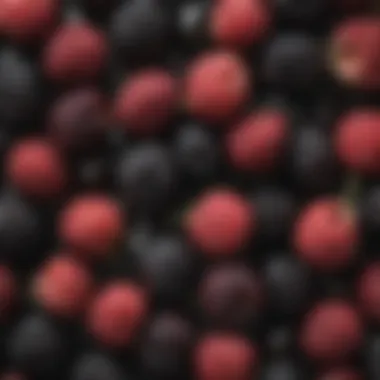Nutritional Wonders of Blackberries: Health Insights


Intro
When it comes to vibrant fruits that pack a nutritional punch, blackberries often don’t get the credit they deserve. These little bursts of flavor not only enchant the palate but also provide an impressive array of health benefits. As health-conscious individuals search for ways to enrich their diets, understanding the nutritional profile of blackberries can be both enlightening and practical.
These berries are a treasure trove of vitamins, minerals, and antioxidants, each contributing to their status as a superfood. With the rising trend of incorporating natural ingredients into everyday meals, blackberries emerge as versatile allies in the kitchen and on the plate. Whether you munch them raw, blend them into smoothies, or incorporate them into desserts, these berries promise a delightful sensory experience brimming with nutrients.
In the following sections, we will delve deeper into the numerous benefits blackberries offer, their bioactive compounds, how they contribute to disease prevention, and practical ways to easily integrate them into your culinary repertoire.
Prelims to Blackberries
Blackberries, those luscious little fruits that often bring to mind whispers of warm summer days, are more than just a snack for the discerning palate. They play an essential role in the wider conversation around nutrition and healthy eating. This article aims to dissect the many layers of blackberries, from their history to culinary applications, marketing them not only as a delight for the taste buds but as a powerhouse of nutrition.
Historical Perspective
The journey of blackberries begins centuries ago. Historically, these berries have been gathered in the wild. The ancient Greeks and Romans were not shy about their appreciation for blackberries; they considered them food for the divine. In fact, the flavor and health benefits were extolled in myriad ancient texts, often associated with longevity and vitality. Over time, blackberries found their way into gardens across Europe and later the Americas, where cultivation took off in the 18th and 19th centuries.
Fast forward to today, the esteem for blackberries remains steadfast. With a growing interest in local and sustainable foods, many people are rediscovering blackberries—their roots run deep in the culture of agriculture. The cultivation techniques employed now respect traditional methods while embracing more modern practices that promote sustainability and biodiversity, an important development as we face environmental challenges.
Culinary Uses
Blackberries are versatile. They can be used in a multitude of ways, capturing flavors from sweet to savory. In the kitchen, these berries add vibrancy to dishes. Tossed into a salad, blackberries provide not just a pop of color but also a sweet counterpoint to tangy vinaigrette. When blended into smoothies, they contribute creaminess without heavy calories.
Many dessert aficionados will vouch for the undeniable charm of a blackberry pie. The sweet-tart flavor paired with flaky pastry is not easily matched. Additionally, jams and jellies made from blackberries are a fantastic way to capture summer’s essence, allowing it to linger through the colder months.
"Blackberries lend an artisanal touch to a charcuterie board, elevating the dining experience with their unique flavor."
One might also not associate blackberries with savory dishes, yet they effortlessly elevate pairings like roasted duck or grilled chicken, bringing an unexpected depth. The sweet-tart aspect compliments savory flavors brilliantly, making them a staple worth exploring further in more adventurous culinary contexts.
In essence, the historical relevance and culinary versatility of blackberries set the stage for a deeper dive into their nutritional profile, revealing how these delightful fruits can contribute not just to our taste experiences but to our health as well.
Nutritional Overview of Blackberries
Understanding the nutritional profile of blackberries is essential not only for health enthusiasts but also for anyone interested in optimizing their diet. These small berries pack a powerful punch when it comes to nutritional value. Their rich content of vitamins, minerals, and antioxidants makes them a significant addition to any meal plan. Furthermore, analyzing blackberries’ macro and micro-nutrient components reveals how these tiny fruits can contribute to overall well-being and potential disease prevention. As we dive into the details, we will discover the impact of each nutrient group on health and how they can be best utilized in everyday cooking.
Macro-nutrients
Carbohydrate Content
When it comes to carbohydrates, blackberries are on the lower end of the glycemic scale, which is a major thumbs-up for those managing their blood sugar levels. With about 10 grams of carbs per cup, they offer a significant advantage—while providing essential energy for daily activities, they do not spike blood sugar like some other fruits might. The fruit’s natural sugars are balanced out by the presence of fiber, ensuring stable release into the bloodstream.
Something unique about their carbohydrate content is the presence of dietary fiber. With approximately 7.6 grams of fiber in a single serving, blackberries are highly regarded for digestive health. Not only does this fiber contribute to feelings of fullness—keeping those snack cravings at bay—but it also promotes regular bowel movements.
Protein Levels
Blackberries may not be a significant source of protein compared to some other foods, but they still hold a unique position among berries by providing about 2 grams of protein per cup. This characteristic helps to make them a valuable component of a balanced diet. Protein plays a crucial role in cell repair and muscle development. While you won't be filling up on protein from blackberries alone, they can complement other protein-rich foods effectively.
What stands out is that the type of protein found in these berries may encourage satiety—meaning they can help curb hunger alongside meals, making them a smart choice for those trying to manage their weight.
Fat Composition
Fat composition in blackberries is almost negligible, which is another reason they are appealing to many. With almost no fat—about 0.5 grams per cup—these berries align perfectly with low-fat dietary choices. However, there’s a fascinating aspect of their fat composition that deserves mention: they contain omega-3 and omega-6 fatty acids. These healthy fats are linked to heart health and can help in reducing inflammation.
Overall, while blackberries aren't a source of high-fat content, their very low levels still showcase how versatile and healthy they are. Being nearly fat-free means they are guilt-free, allowing for integration into various diets without the worry of excess calories.
Micro-nutrients


Vitamins
Blackberries stand tall amongst other fruits for their vitamin content. Packed with vitamin C, vitamin K, and a handful of B vitamins, they bolster the immune system and contribute to skin health, among other benefits. A cup of blackberries provides more than half of the daily recommended intake of vitamin C, which is vital for collagen production and acts as a powerful antioxidant.
Incorporating blackberries regularly can thus enhance skin health, improve iron absorption, and support overall well-being. They truly shine in their ability to offer so much while keeping calories low.
Minerals
Moving to minerals, blackberries are not to be overlooked. They contribute significantly to daily needs for minerals such as manganese and magnesium. Manganese plays a role in bone health and metabolism, making blackberries beneficial for maintaining healthy bodily functions. The magnesium in blackberries works to regulate muscle and nerve function, blood sugar levels, and blood pressure.
Thus, these berries are especially notable not just for their tastes but also for encapsulating a wide range of health benefits through their mineral content. Regular inclusion of blackberries can provide essential nutrients that might otherwise be missed in daily diets.
"Blackberries are a small package of health benefits, making them a powerhouse in nutrition."
In summary, the nutritional overview of blackberries reveals them to be a valuable ally in health—both enjoyable to eat and beneficial for the body. Each nutrient contributes uniquely, making them a worthy addition to any diet.
Health Benefits of Blackberries
The health benefits of blackberries are worth emphasizing because they serve as a natural remedy, a delicious treat, and a powerhouse of nutrition. Including blackberries in your diet can lead to a multitude of positive health outcomes. From antioxidants that fend off free radicals to compounds that may keep heart disease at bay, blackberries pack a significant punch. This section will detail some key elements that contribute to their reputation as a superfood while providing insightful considerations about their health impacts.
Antioxidant Properties
Polyphenols
Polyphenols are plant-based compounds that unleash a cascade of benefits, focusing primarily on combating oxidative stress. One of the standout reasons blackberries attract attention is their high polyphenol content. These compounds have been shown to help protect cells from damage and are linked to reducing the risk of chronic diseases. The unique feature of polyphenols lies in their ability to modulate various biological pathways, assisting the body in maintaining homeostasis.
Their advantage is that they are naturally occurring and can be easily introduced into your diet through fruits like blackberries. However, it's worth noting that the effectiveness of polyphenols can sometimes be influenced by preparation methods; cooking might degrade some of these beneficial compounds.
Anthocyanins
Anthocyanins provide not just the rich purple hue of blackberries but also contribute significantly to health. These pigments not only act as antioxidants but also have anti-inflammatory properties. This compound sets the stage for better heart health and cognitive function. Their key characteristic? They increase the production of certain signaling molecules that can enhance blood circulation and brain function.
The unique aspect of anthocyanins is their varying effectiveness based on the fruits' ripeness and preparation. Though fresh is best, even frozen blackberries can still retain a good amount of these beneficial compounds, offering a practical storage alternative.
Anti-inflammatory Effects
Blackberries hold properties that can counteract inflammation in the body. Chronic inflammation is often tied to various health issues, including heart disease and arthritis. The compounds found in blackberries work to inhibit inflammatory markers and pathways, providing a natural defense against such ailments. Regular consumption can be a step toward incorporating a dietary strategy that promotes overall wellness.
Digestive Health
Fiber Contribution
The fiber content in blackberries is noteworthy. Dietary fiber plays a crucial role in digestion and contributes to a feeling of fullness, which can help with weight management. About 7.6 grams of fiber can be found in one cup of blackberries. This high fiber level is essential in promoting regular bowel movements and helping to prevent constipation. The important part of fiber is its ability to support gut health by serving as food for beneficial gut bacteria and enhancing the gut microbiome.
Another aspect to consider is the soluble vs. insoluble fiber ratio. Blackberries contain both types, providing a comprehensive approach to dietary fiber intake.
Gut Microbiota
Gut microbiota refers to the vast community of microorganisms residing in the digestive tract. Consumption of blackberries may positively influence these microbes, promoting a diverse and balanced gut environment. A well-maintained gut microbiota has been associated with better digestion, improved immune system function, and even mental health benefits. The natural sugars and fiber in blackberries foster a healthy environment for these microbes, making them a smart addition to one’s diet.
Heart Health
Cholesterol Regulation
The ability of blackberries to help regulate cholesterol is another aspect that enhances their importance in a health-conscious diet. Specifically, the soluble fiber in blackberries helps bind cholesterol in the digestive system, facilitating its removal from the body. This process is essential for maintaining a healthy cholesterol level, thereby reducing the risk of atherosclerosis and other cardiovascular diseases. Incorporating blackberries into meals can contribute to this preventive measure, though they should be part of an overall heart-healthy diet.
Blood Pressure Benefits


Another significant plus with blackberries is their potential to aid in regulating blood pressure. The potassium in blackberries plays a pivotal role here. Potassium is known for its ability to counteract the effects of sodium, helping relax blood vessel walls and thus lowering blood pressure. While blackberries can be a valuable asset in dietary strategies, they should not be considered a sole solution.
Cognitive Function
The neuroprotective benefits of blackberries deserve attention. Studies suggest that the compounds within blackberries can enhance memory and other cognitive functions. This potential benefit is attributed to their high antioxidant content, which may protect brain cells from oxidative stress. Regularly consuming blackberries might not only keep one’s heart healthy but also support brain health as one ages. While lifestyle factors greatly influence cognitive function, blackberries can provide that extra edge in dietary support.
Comparative Analysis with Other Berries
Understanding the place of blackberries in the broader spectrum of berries is crucial for anyone interested in the nutrition they deliver. By comparing blackberries to other well-known berries like raspberries and blueberries, one can appreciate the unique advantages that each berry brings to the table, both in terms of taste and nutritional benefits. This comparative analysis helps food lovers make informed dietary choices while understanding how each berry fits into a healthy lifestyle.
Raspberries
Raspberries, like blackberries, are part of the Rubus genus and share a similar texture and taste profile, yet they present their own distinctions that are worth noting. For starters, raspberries shine in their lower sugar content. An average serving of raspberries tends to pack fewer grams of sugar compared to blackberries, making them a favored choice for those watching their sugar intake. Additionally, they are rich in dietary fiber, with a single cup offering around 8 grams.
Raspberries also have a strong antioxidant profile, but they mainly come from ellagic acid. This compound is known for its anti-cancer properties. On the other hand, blackberries bring a robust level of vitamin C to the mix. A cup of blackberries holds more than one-third of the recommended daily intake. Therefore, while raspberries might edge out slightly in terms of calorie control, blackberries hold their own with a striking flavor and more vitamin C.
In a nutshell, if you want to enjoy sweet flavors while maintaining a nutritious edge, tossing a handful of each berry into a salad or a smoothie can provide a balanced approach.
Blueberries
Blueberries are often hailed as a superfood, and with good reason. They're loaded with antioxidants, particularly anthocyanins, which are the pigments responsible for their deep blue hue. These anthocyanins have been linked to numerous health benefits, including enhanced brain function and reduced risk of heart disease. Compared to blackberries, blueberries contain a higher sugar content, which can influence taste preferences depending on dietary goals.
Interestingly, while blackberries provide a broader range of vitamins like vitamin A and vitamin K, blueberries stand out in their ability to combat inflammation. Research suggests that the compounds in blueberries may help in reducing the risk of chronic diseases.
In terms of culinary uses, blueberries are often used in sauces or jams, whereas blackberries find their way into desserts or eaten fresh. Both berries integrate seamlessly into breakfast bowls or baked goods, offering flexibility in their application.
In Summary
The comparative analysis of blackberries with raspberries and blueberries not only sets a platform for appreciation of their individual qualities but also equips health-conscious individuals with guidance for their dietary inclusions. Each berry contributes to a nutritious and vibrant diet:
- Raspberries: Lower in sugar, high in fiber, and strong antioxidant profile with ellagic acid.
- Blueberries: High in anthocyanins, beneficial for heart health, but contain more sugar.
- Blackberries: High in dietary fiber, vitamin C and a unique flavor that compliments many dishes.
Ultimately, diversifying berry intake can enhance your nutrient profile while still keeping your meals delicious. Incorporating all types of berries into your diet ensures not only a play of taste but also an enriched belly!
Incorporating Blackberries into Daily Diet
Adding blackberries to your daily meals isn't just a tasty choice; it’s a leap toward a healthier lifestyle. With their low calorie count, high fiber content, and an array of essential vitamins, blackberries not only satiate your sweet tooth but also bolster your health. They can easily be integrated into your diet in various ways, maximizing both their health benefits and culinary appeal.
As a Snack
Blackberries make for an easy, delicious snack. Their natural sweetness satisfies cravings without veering into overly sugary territory. Whether you’re munching them straight from the container or tossing them into a small salad, they provide a boost in energy and nutrition. Consider pairing blackberries with a handful of nuts for a balanced snack that melds healthy fats and proteins with the fiber-rich fruit. This combination can keep your blood sugar stable and stave off hunger pangs between meals.
- Convenience: No prep needed, just rinse them off.
- Portability: Great for on-the-go, toss them in your bag!
- Nutritional Boost: A source of vitamins C and K.
In Smoothies
Smoothies offer a fantastic way to integrate blackberries into your diet. Their vibrant color and bold flavor can enliven various blends. When you toss blackberries into a smoothie, not only do you amp up the taste, but you also pack in antioxidants that combat oxidative stress. A simple concoction can include blackberries, spinach, a banana, and almond milk.
Try different combinations:
- Berry Blast: Blackberries, strawberries, and yogurt.
- Green Power: Blackberries, kale, and coconut water.
- Tropical Twist: Blackberries, pineapple, and coconut milk.
Experimenting with proportions and ingredients can help tailor flavors to your preference. The beauty lies in their versatility—whether you're looking for sweetness, tartness, or a creamy texture, blackberries can adjust to suit.
In Baking


Incorporating blackberries into baked goods introduces a unique flavor and texture to your treats. They lend a delightful burst of juiciness to muffins, cakes, or even bread. When you fold in fresh or frozen blackberries, you not only enhance the taste but also introduce beneficial nutrients to your creations. Try your hand at blackberry muffins using whole grain flour for a hearty option that doesn't skimp on flavor.
- Star Recipes:
- Blackberry cobbler for a classic dessert.
- Blackberry pancakes for an indulgent breakfast.
- Blackberry-infused scones for a refined brunch treat.
When testing recipes, remember that overmixing can lead to a muddled texture. Gently folding the berries into the batter preserves their shape, providing those inviting pockets of flavor in each bite.
Blackberries are a powerhouse of nutrition, ready to enhance your meals while keeping health a priority.
Storage and Preparation Tips
Understanding how to properly store and prepare blackberries is crucial for maintaining their flavor and nutritional value. When handled correctly, these berries can offer a fresh and vibrant addition to your diet. Let’s delve into how to keep blackberries at their best from shopping to preparation.
Selection Criteria
When selecting blackberries, look for fruits that boast a deep, dark purple to black color. The berries should be plump and firm to the touch, signaling ripeness. Avoid berries that are overly soft or show signs of mold, as they are past their prime. A quick tip: the best blackberries often come with a slight sheen. This freshness indicator suggests that they were recently picked and are likely to yield the best flavor.
Here’s what you might consider when choosing your blackberries:
- Color: Look for rich, dark hues without white or reddish patches.
- Texture: Berries should feel plump and slightly firm.
- Aroma: Fresh blackberries should have a sweet, fragrant smell.
- Packaging: If buying pre-packaged, inspect for any damage or moisture inside.
Handling and Washing
Once you've brought home your blackberries, it’s time to store and clean them properly. Blackberries are delicate, so handle them with care to avoid bruising. When washing, don’t let them soak in water, as they can become waterlogged. Instead, gently rinse them under cold running water just before eating or using them in recipes. Allow them to dry on a clean kitchen towel or a colander. This approach helps preserve their texture and taste.
A few additional handling tips:
- Don’t wash until ready to use: Washing prematurely can lead to spoilage.
- Store in a single layer: This prevents bruising and allows better airflow.
- Remove damaged berries: Regularly check for and remove any that are moldy or squished, as they can affect the rest of the batch.
Storage Techniques
To keep your blackberries fresh, it’s important to store them properly. If you plan to eat them within a few days, refrigerate them in their original container or transfer them to a shallow dish, covering with a dry paper towel to absorb excess moisture. This simple trick can extend their freshness.
For longer storage:
- Freezing: Rinse and dry the berries. Spread them in a single layer on a baking sheet and freeze. Once frozen, transfer them to vacuum-sealed bags or airtight containers to prevent them from clumping. This method locks in their flavor, making them perfect for smoothies or baking later on.
- Canning: Although not common, canning blackberries can preserve their taste. Follow a reputable canning guide for safety and best practices.
Remember, blackberries are best enjoyed fresh, but with proper handling and storage, they can still be delightful long after harvest.
In summary, proper selection, careful handling, and effective storage methods can significantly enhance your experience with blackberries. By following these tips, you ensure that every bite is as delicious and nutritious as possible.
End
In concluding the exploration of blackberries, it becomes clear that these small, dark fruits pack a hefty nutritional punch. Not only are they delightful in taste, but they also contribute significantly to one’s overall health. The summary of health benefits ties together the various advantages discussed throughout this article, particularly emphasizing their strong antioxidant properties and their role in supporting heart health and cognitive functions. The presence of vitamins and dietary fiber enriches their profile, making blackberries a worthy addition to any diet.
Summary of Health Benefits
The health benefits of blackberries can be grouped into several key areas:
- Antioxidant Properties: Blackberries are high in polyphenols like anthocyanins, which combat oxidative stress, potentially lowering the risk of chronic diseases.
- Digestive Health: With a substantial fiber content, they aid digestion, promote gut health, and help prevent constipation.
- Heart Health: Regular consumption can stabilize cholesterol levels and support blood pressure regulation, thus fortifying cardiovascular health.
- Cognitive Function: Some studies suggest that antioxidants in blackberries may enhance memory and cognitive skills, enabling better mental clarity.
"The regular inclusion of blackberries in one’s diet is like fortifying a castle—making it resilient against various health threats."
These benefits illustrate the multifaceted role blackberries play not just as a snack, but as a vital component of a healthful lifestyle.
Future Research Directions
While the existing studies certainly highlight numerous benefits of blackberries, the depth of research remains relatively shallow in various areas. Future research could focus on:
- The long-term effects of blackberry consumption on chronic illness prevention.
- Effects of different preparations, such as juicing versus whole fruit consumption, on nutrient availability.
- Exploration into the potential effects of blackberries on specific populations, like athletes or those with metabolic disorders.
- Investigating how blackberries interact with medications or supplements to maximize their health benefits.
In essence, as more becomes known about blackberries and their potent properties, this knowledge could lead to enhanced dietary recommendations and encourage a broader incorporation into culinary practices. Understanding these tastes can illuminate more ways to entice the palate while nourishing the body.







